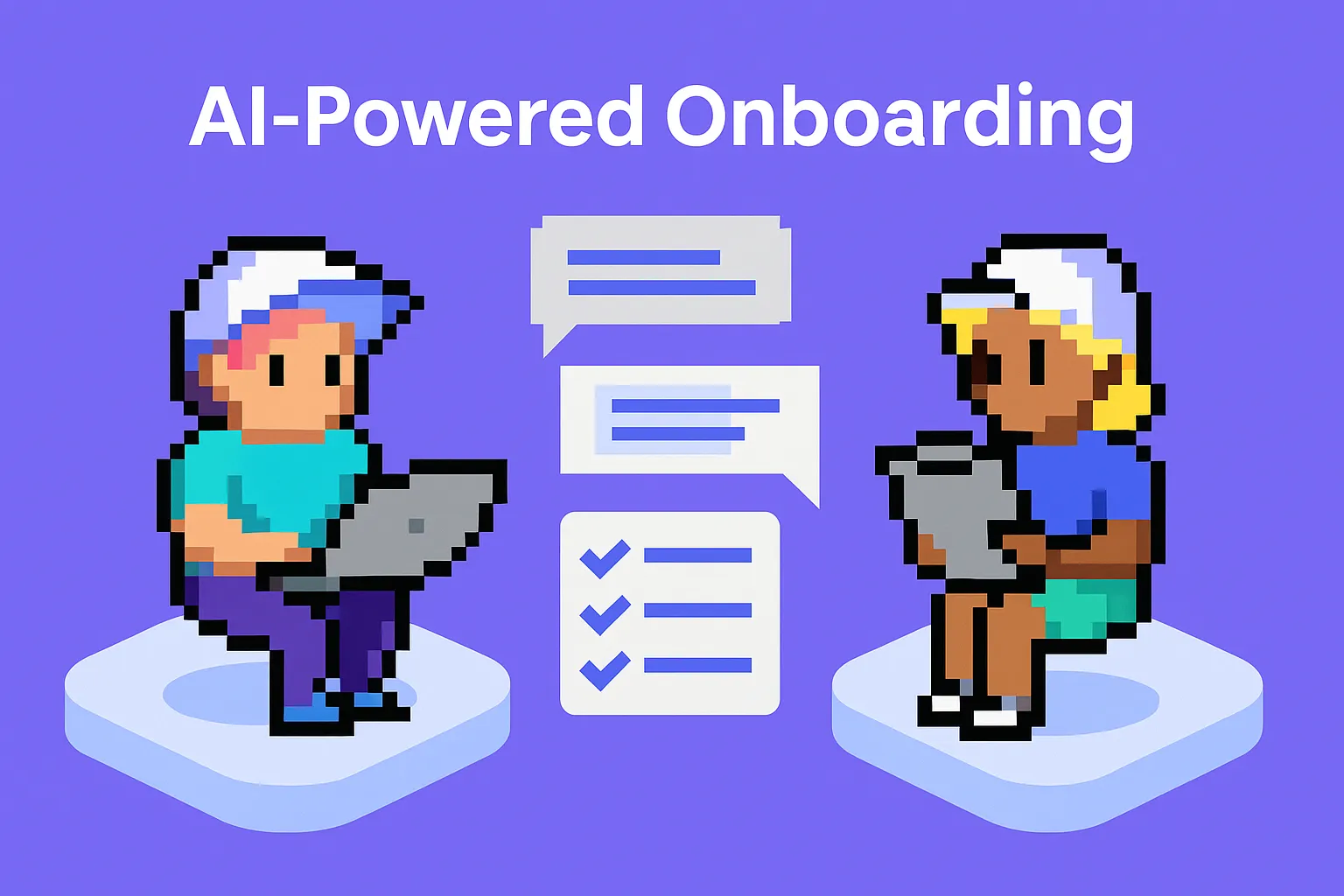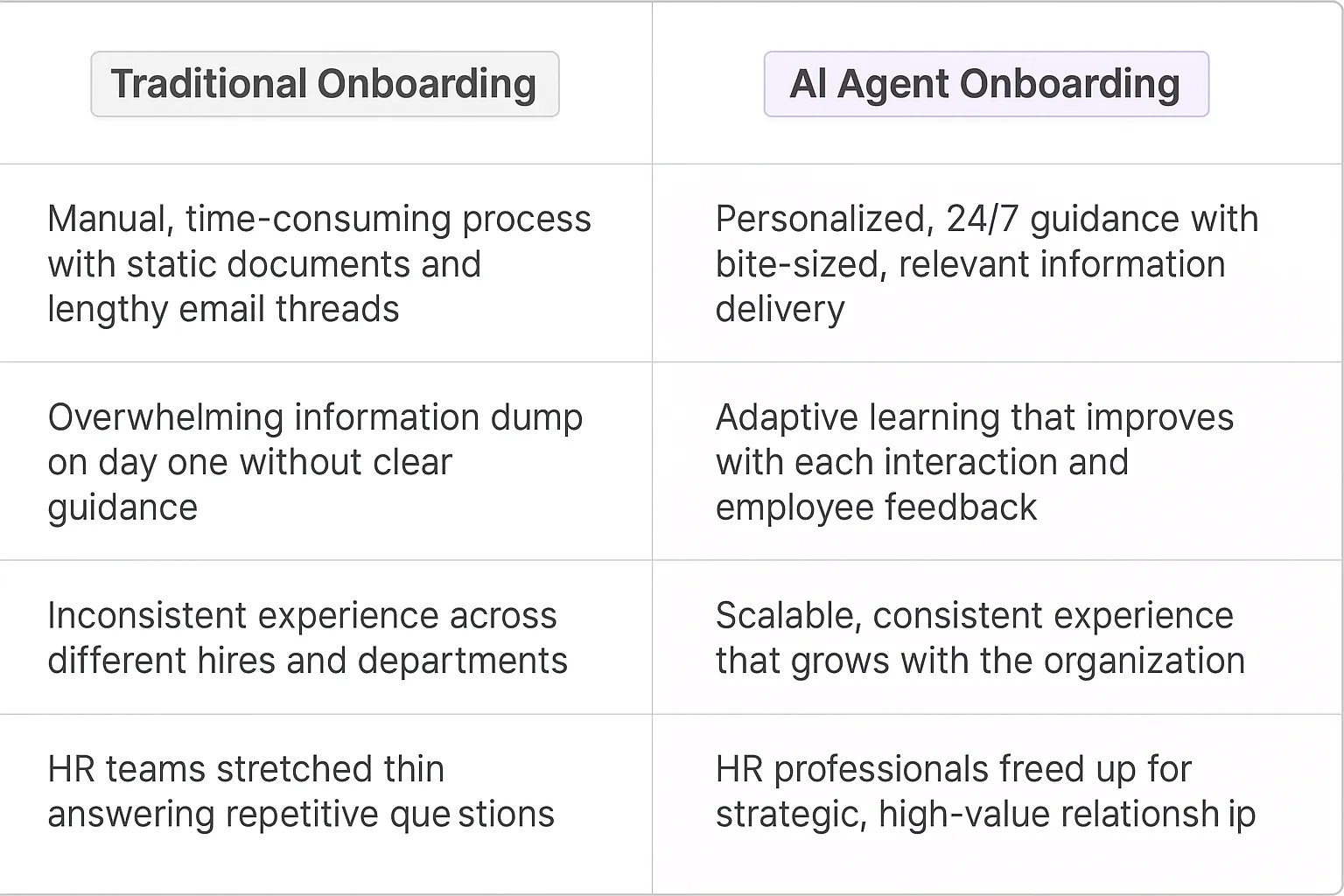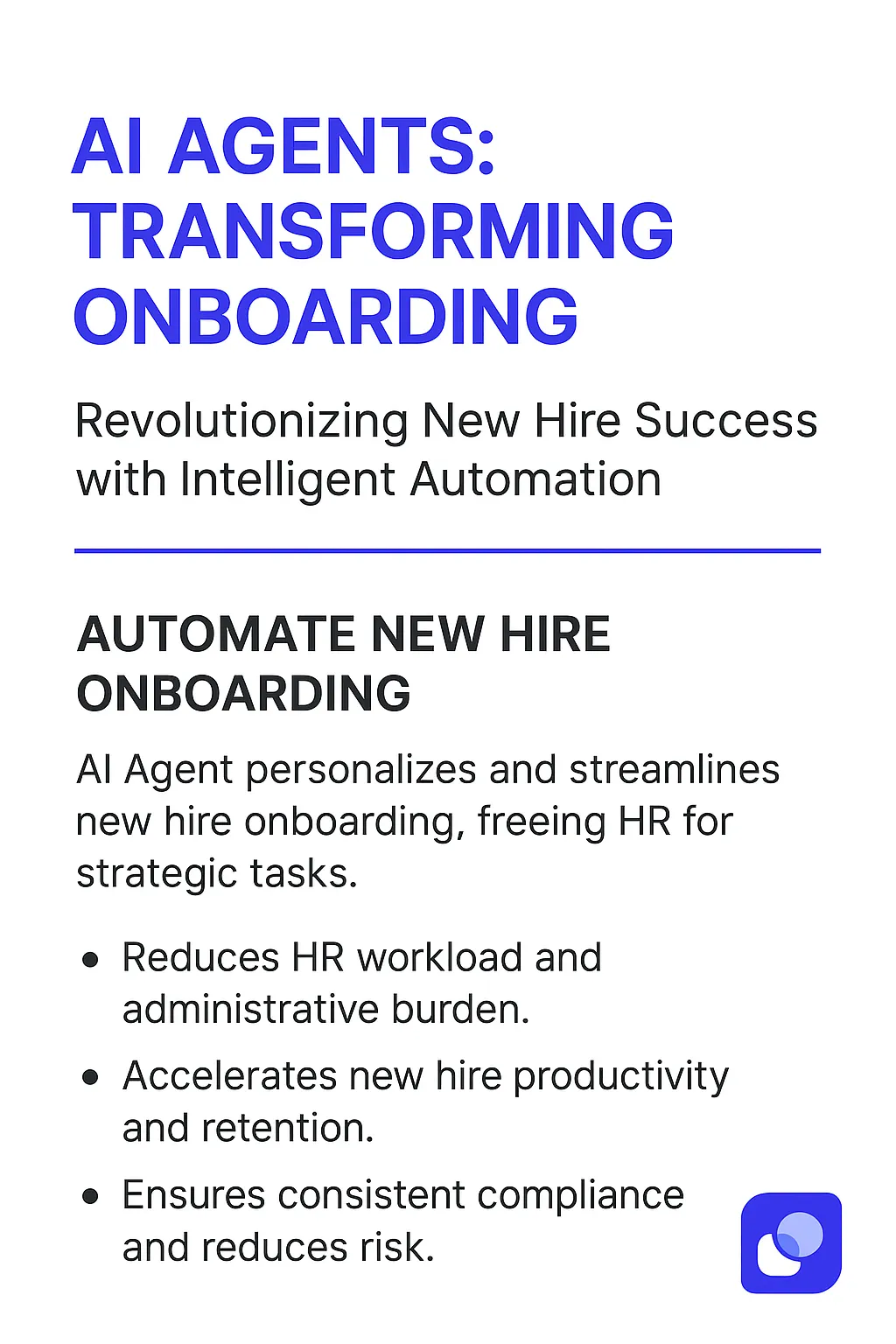Employee Onboarding AI Agents
The Rise of AI Agents in Employee Onboarding
Employee onboarding is the critical process of integrating new hires into an organization. It's more than just paperwork and orientation - it's about setting up employees for success from day one. Traditionally, this process has been manual, time-consuming, and often inconsistent. But now, AI agents are changing the game.
AI agents for employee onboarding are like having a personal guide for each new hire. They offer 24/7 availability, personalized information delivery, and continuous learning capabilities. These digital teammates can handle everything from answering FAQs to creating tailored onboarding roadmaps. They're not replacing human HR professionals, but rather augmenting their capabilities, allowing them to focus on high-value, strategic tasks.

Benefits of AI Agents for Employee Onboarding
What would have been used before AI Agents?
Before AI agents entered the scene, employee onboarding was a clunky, time-consuming process. HR teams relied on a mishmash of static documents, lengthy email threads, and repetitive in-person orientations. New hires often felt overwhelmed, drowning in a sea of information without a clear path forward. It was like trying to assemble IKEA furniture without instructions – frustrating and inefficient.
Companies attempted to patch this broken system with band-aid solutions: creating massive wikis that quickly became outdated, scheduling endless orientation meetings that ate into productivity, or worse, leaving new employees to fend for themselves in a "sink or swim" approach. The result? A disjointed onboarding experience that left new hires feeling lost and HR teams stretched thin.
What are the benefits of AI Agents?
Enter AI agents for employee onboarding – the game-changer that's redefining how we welcome new talent. These digital teammates are like having a personal onboarding concierge for each new hire, available 24/7 and infinitely scalable.
First off, AI agents crush information overload. They serve up bite-sized, relevant info exactly when a new hire needs it. No more firehose of data on day one. Instead, it's a curated, personalized drip feed of knowledge that adapts to each employee's role and learning pace.
But here's where it gets really interesting: AI agents learn and improve with each interaction. They're constantly refining their responses based on the questions asked and feedback received. This creates a flywheel effect – the more employees use the system, the smarter and more effective it becomes for future hires.
AI agents also excel at identifying knowledge gaps. They can spot trends in the questions being asked and flag areas where the onboarding process might be falling short. This gives HR teams actionable insights to continuously improve their onboarding strategy.
Perhaps most importantly, AI agents free up human HR professionals to focus on high-value, strategic work. Instead of answering the same basic questions over and over, they can dedicate their time to building relationships, fostering company culture, and tackling complex HR challenges.
The end result? Faster ramp-up times, higher employee satisfaction, and a more efficient HR team. It's not just an incremental improvement – it's a fundamental reimagining of the onboarding process that has the potential to significantly impact a company's bottom line.

Potential Use Cases of AI Agents for Employee Onboarding
Processes
Employee onboarding is a critical process that sets the tone for a new hire's entire journey with a company. AI agents can transform this experience, making it more efficient and personalized. Let's dive into some game-changing use cases:
- Personalized onboarding roadmaps: AI agents can analyze a new hire's role, experience, and skills to create tailored onboarding plans. This ensures each employee gets the most relevant information and training.
- Automated documentation collection: AI can manage the tedious process of gathering necessary paperwork, sending reminders, and validating submitted documents. This frees up HR teams to focus on more high-touch aspects of onboarding.
- Culture assimilation: AI agents can curate and deliver content that helps new hires understand and integrate into the company culture, from explaining inside jokes to highlighting key company values.
- Cross-departmental coordination: AI can orchestrate the complex dance of setting up accounts, scheduling meetings, and coordinating introductions across various departments, ensuring nothing falls through the cracks.
Tasks
Breaking down the onboarding process into specific tasks, AI agents can excel in:
- Answering FAQs: An AI agent can be the first point of contact for new hires, answering common questions about benefits, policies, and procedures 24/7.
- Scheduling and calendar management: AI can handle the logistics of setting up orientation sessions, training workshops, and meet-and-greets with team members.
- Equipment and access provisioning: AI agents can trigger and track the process of setting up workstations, issuing company devices, and granting necessary system access.
- Progress tracking: AI can monitor each new hire's onboarding progress, sending personalized nudges for incomplete tasks and celebrating milestones.
- Feedback collection: AI can gather real-time feedback from new hires throughout the onboarding process, allowing for continuous improvement of the experience.
The integration of AI agents into employee onboarding isn't just about efficiency—it's about creating a memorable, personalized experience that sets new hires up for success from day one. By offloading routine tasks to AI, human HR professionals can focus on building genuine connections and addressing complex, nuanced aspects of bringing new talent into the fold.
As companies scale, the ability to maintain a high-quality, consistent onboarding experience becomes increasingly challenging. AI agents offer a solution that can grow with the organization, ensuring that whether you're onboarding your 10th employee or your 10,000th, each person feels valued, informed, and ready to contribute.
The future of employee onboarding is here, and it's powered by AI. Companies that embrace this technology will find themselves with a significant advantage in the war for talent, creating first impressions that last and setting the stage for long-term employee success and satisfaction.

Industry Use Cases: AI Agents Transforming Employee Onboarding
AI agents are reshaping employee onboarding across industries, bringing a level of efficiency and personalization that was previously unattainable. These digital teammates are not just automating tasks; they're fundamentally altering how companies welcome and integrate new hires. Let's dive into some industry-specific examples that illustrate the transformative power of AI in onboarding processes.
From tech startups to Fortune 500 companies, organizations are leveraging AI to create smoother, more engaging onboarding experiences. These AI-driven approaches are solving long-standing pain points, reducing time-to-productivity, and fostering stronger connections between new employees and their teams from day one.
The following use cases demonstrate how AI agents are being deployed in various sectors to tackle unique onboarding challenges. They showcase the adaptability of AI in addressing industry-specific needs while maintaining a human-centric approach to welcoming new team members.
Retail Revolution: AI-Powered Onboarding for the Next-Gen Workforce
The retail industry is ripe for an AI-driven onboarding overhaul. Think about it: high turnover rates, seasonal hiring spikes, and a constant need to stay ahead of consumer trends. This is where Employee Onboarding AI Agents step in to transform the game.
Let's break it down. A major clothing retailer – let's call them "TrendSetters Inc." – implements an AI onboarding system. From day one, new hires interact with a personalized digital teammate that knows the ins and outs of the company like a seasoned pro.
This AI doesn't just regurgitate an employee handbook. It's a dynamic system that adapts to each new hire's role, learning style, and prior experience. Sales associates get immersive training on the latest fashion lines and upselling techniques. Back-office staff dive into inventory management systems with hands-on simulations.
The real magic happens when the AI starts predicting and addressing potential pain points before they arise. It notices a new hire struggling with the POS system? Boom – extra training modules appear. Someone's crushing their customer service metrics? The AI flags them for fast-track management training.
But here's the kicker: this isn't just about faster onboarding. It's about creating a workforce that's constantly evolving. The AI doesn't clock out after the first week. It's there, learning, adapting, and pushing employees to grow throughout their tenure.
The result? TrendSetters Inc. sees a 40% reduction in time-to-productivity for new hires. Employee satisfaction scores skyrocket. And suddenly, they're not just selling clothes – they're cultivating a workforce that's as dynamic and trendsetting as their latest fashion line.
This isn't sci-fi. It's the new frontier of retail workforce development. And the brands that embrace it will leave their competition in the dust, wondering how they missed the memo on AI-powered onboarding.
Construction's AI Foreman: Building a Smarter Workforce from Day One
The construction industry is ripe for disruption, and AI-powered onboarding is the wrecking ball that's about to demolish outdated practices. Let's dive into how a forward-thinking construction firm, BuildTech Innovations, is leveraging AI to create a workforce that's as solid as the foundations they lay.
BuildTech's AI onboarding agent isn't just a glorified PDF reader. It's a digital foreman that knows every nail, bolt, and safety regulation in the book. From day one, new hires are immersed in a personalized learning experience that adapts faster than concrete sets.
Here's where it gets interesting: The AI doesn't just teach; it predicts. It analyzes each worker's progress, identifying potential safety risks or skill gaps before they become issues on the job site. A crane operator struggling with load calculations? The AI serves up targeted simulations. An electrician breezing through wiring tasks? It fast-tracks them to advanced certifications.
But the real game-changer is how this AI bridges the gap between seasoned pros and green recruits. It captures the tribal knowledge of veteran builders – those hard-earned tricks of the trade that usually take years to learn – and serves them up to newcomers in digestible, context-specific chunks.
The results are as impressive as a perfectly executed skyscraper. BuildTech sees a 50% reduction in onboarding time, a 30% decrease in on-site accidents, and a workforce that's continuously upskilling. They're not just building structures; they're constructing a learning ecosystem that evolves with every project.
This isn't just about getting workers up to speed faster. It's about creating a construction workforce that's as adaptable as the industry is unpredictable. In an era where project specs can change overnight and new sustainable building practices emerge constantly, this AI-driven approach ensures BuildTech's team is always ahead of the curve.
The construction firms that nail this AI onboarding approach will build more than just buildings – they'll construct the future of the industry itself. And those who don't? Well, they might find themselves on shaky ground, wondering how they missed the foundation of the next construction revolution.
Considerations
Technical Challenges
Implementing an Employee Onboarding AI Agent isn't just about plugging in some fancy tech and calling it a day. It's a complex dance of data, systems, and human touch points. First off, you're dealing with a mishmash of legacy systems that weren't designed to play nice with AI. HR databases, payroll systems, and learning management platforms often speak different languages, making data integration a nightmare.
Then there's the AI model itself. Training it to understand the nuances of your company's culture, policies, and procedures is like teaching a toddler quantum physics. It requires massive amounts of clean, structured data - something most companies don't have lying around. And let's not forget about security. You're handling sensitive employee information, so your AI needs to be Fort Knox-level secure, compliant with a alphabet soup of regulations like GDPR, CCPA, and whatever new acronym regulators cook up next week.
Operational Challenges
On the operational side, you're essentially asking your organization to embrace a digital teammate. That's a tough sell, especially for HR folks who pride themselves on the human touch. There's a real risk of creating a uncanny valley effect where the AI is just human-like enough to be creepy, but not enough to be truly helpful.
Change management is another beast altogether. You're not just introducing a new tool; you're fundamentally altering how people work. Expect resistance, especially from middle managers who might see the AI as a threat to their role. And don't underestimate the learning curve. Even with the most intuitive UI, you'll need to invest heavily in training and support to get people comfortable with their new AI colleague.
Lastly, there's the question of ROI. Unlike a traditional software implementation where you can point to clear efficiency gains, the benefits of an AI onboarding agent are often soft and hard to quantify. How do you measure improved employee satisfaction or better cultural alignment? It's not impossible, but it requires a level of sophistication in analytics that most companies simply don't have.
In the end, implementing an Employee Onboarding AI Agent is less about the technology and more about orchestrating a complex change in how your organization thinks about and executes onboarding. It's a high-risk, high-reward endeavor that requires a clear vision, strong leadership, and a willingness to fail fast and learn faster.
The Future of Employee Onboarding: AI Agents Reshaping Talent Integration
AI agents are not just a trend in employee onboarding - they're the future. By tackling information overload, personalizing the onboarding experience, and freeing up HR teams for more strategic work, these digital teammates are fundamentally reimagining how companies welcome new talent. While challenges exist in implementation, the potential benefits are enormous. From retail to construction, industries across the board are seeing faster ramp-up times, higher employee satisfaction, and more efficient HR processes. As AI technology continues to evolve, we can expect even more innovative applications in the onboarding space. Companies that embrace this technology now will find themselves with a significant advantage in attracting, retaining, and developing top talent. The AI-powered onboarding revolution is here, and it's reshaping the future of work one new hire at a time.













